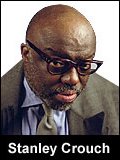
Stanley Crouch: Reformation of Islam - The Sacramento Bee:
By Stanley Crouch
Published 2:15 am PST Saturday, February 18, 2006
During the 1960s, a white Southerner made me aware of a problem that now seems to be common to the complexity faced by modern people of many different societies and religions: The loose screws among them have come to represent the entire group.
Forty years ago, the white Southerner said to me that all of the televised redneck violence in reaction to the civil-rights movement had made his Southern accent a social liability. Northern white people tended to assume, once they heard the sound of his voice, that he supported the Ku Klux Klan, had probably brutalized a black man and could easily have taken advantage of a black woman, who might be the mother of his unacknowledged child. It took them a while to discover that he was a supporter of the civil-rights movement and had had to leave the South because his opinions endangered the safety of his wife and children.
I am sure that this problem is now felt in what one Muslim scholar calls "liberal Islam." I encountered the term while reading material written by Dr. Radwan Masmoudi, founder and president of the Center for the Study of Islam and Democracy, which is based in Washington, D.C., and is a nonprofit think tank. Masmoudi is from Tunisia and immigrated to the United States in 1981. He has a degree from the Massachusetts Institute of Technology in robotics and automation, and is an advanced control engineer. He is also the editor in chief of his think tank's publication, Muslim Democrat.
So he's been around. But there is much to be learned from reading his piece titled "The Silenced Majority," which he published in 2003 in the Journal of Democracy. It informs us that being a modern Muslim means more than wearing a suit instead of a robe. Masmoudi writes that the Muslim world is troubled by the battle going on between secular and religious extremists. But, he writes, "Between these two extremes, we find the majority of the people, who want to practice their religion faithfully, but who also want to live in the modern age - i.e., they want a modern, moderate, and appropriate interpretation of Islam."
Masmoudi does not see this happening overnight, but is sure that the first thing that must come about is the freedom to debate issues and to criticize Islamic governments and policies, a basic tenet of democracy. This sort of freedom exists under neither the secular nor religious Islamic governments, both of which tend to take the position that it will be their way or the highway.
There is hope, says Masmoudi, because liberal Islam is rolling along quite well in the United States and Europe. "The reformation of Islam," he writes, "will require freedom and democracy, and right now the only place where we have them is in the West."
We should not be naive about a reformation taking place within the Islamic world next week, next month or next year, even in the next decade. But neither should we be prematurely cynical about liberal Islam growing to the point that it will influence first and take over second. All we are actually talking about are things that we take for granted, such as free speech, freedom of the press and a diversity of freely expressed opinion. When we look at the most conservative versions of Islam, we can easily understand why all of those freedoms were hard to come by at certain points in Western democratic history.
Warriors are only interested in, understandably, the nuances of command and performance in battle. Recognition that humanity always means endless nuance is a foundation of democracy. Recognition is always the beginning of revolution. The idea of freedom always precedes its becoming true within a society. Masmoudi says that the majority of those in the Muslim world want what we know as freedom, and do not believe that their religion is threatened by it. Let us hope that he is right, which might mean that some of us might live to see that old saying become true in the Islamic world: It is always darkest before dawn.
About the writer:
* Stanley Crouch is a columnist for the New York Daily News. His column routinely appears Saturday in The Bee and occasionally on other days. Reach him at scrouch@edit.nydailynews.com. Distributed by King Features Syndicate Inc.
No comments:
Post a Comment